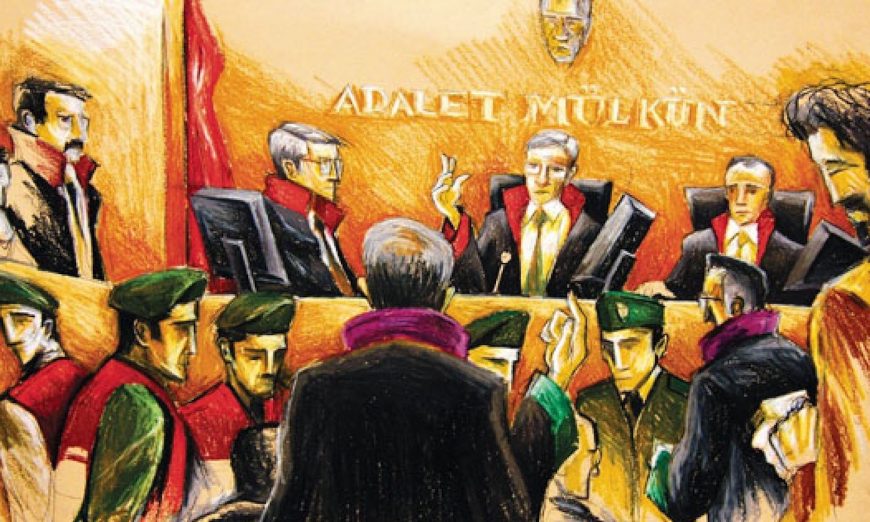According to some, the ruling party is now taking revenge for the closure case against it. For some Westerners, the Ergenekon case is just a part of the dirty war between the Justice and Development Party (AK Party) and those looking to maintain the status quo in Turkey. I am trying to put myself in the shoes of the man on the street in Turkey. If I were them, I would probably reach the same conclusion and believe that Ergenekon is just a fabricated story by some circles in Turkey. It is quite easy to reach this kind of conclusion if you read some “mainstream” media outlets. Certain media groups have actively been spreading this propaganda, and they are doing it using quite sophisticated methods.
My perspective though, is completely different from what these media groups have been trying to convince us of. I am a human rights lawyer, and I have known “deep state gangs” for such a long time. In 1997 and 1998, I was working on cases of village destruction and extrajudicial killings in southeastern Turkey. I was representing Kurdish villagers before the European Court of Human Rights. Since then, I have known about JİTEM — an infamous illegal apparatus of the gendarmerie, the very existence of which have always been denied. JİTEM kidnapped and killed thousands of Kurds who were believed to be members or supporters of the outlawed Kurdistan Workers’ Party (PKK). Today, founders of this illegal organization are in prison in connection with the Ergenekon case. Even children in the Kurdish regions of Turkey knew the names of these JİTEM commanders. These people were never held accountable for the crimes they committed before. These JİTEM people were very active in the operational part of Ergenekon.
I also have some other reasons to believe that Ergenekon is much bigger and much more complex than most people think. These reasons, once again, spring from my personal experience.
Malatya massacre
In April 2007, three missionaries were killed in quite a barbaric way in Malatya. Their throats were slit after long being tortured by their murderers, five ultranationalist youngsters. The protestant community in Turkey asked me to follow the case and to represent the families of the victims before the criminal court where the accused would be tried. After briefly reviewing the file, I came to the conclusion that the case was much more complex than it first appeared. I also got the impression that some “deep state elements” may have had a hand in the case. Therefore, I decided to invite lawyers from different cases in which the deep state had been implicated to take part in Malatya case. More than 20 lawyers kindly agreed to join the legal team in this case. However, this move apparently made the real perpetrators behind this case very angry. When we went to Malatya, the news in the local media was shocking. My picture and an agitating story appeared in the local newspapers. They were portraying me and my colleagues as provocateurs whose only purpose was to harm the reputation of Malatya. After a while, I started to receive highly sophisticated and serious threats. However, the most shocking and disturbing thing happened later on. After gaining a deeper understanding of the case file, I came to conclusion that this case and some other murders were somehow linked to each other. Detecting many similarities in the murder of Father Andrea Santoro in Trabzon in 2006, the killing of Turkish-Armenian journalist Hrant Dink in January 2007 and the Malatya massacre case, I thought all these murders were carried out by the Turkish Gladio (the name given to secret armies established in NATO countries; Turkey is the only country that has never dissolved this structure in the state). I started to tell my theory to my colleagues over the phone: “Hey, I think these cases are linked to each other and these murders were carried out by the Turkish Gladio. I came to this conclusion after considering these factors…” After I told this theory of mine to a couple of colleagues an extremely strange thing happened.
The Turkish Gladio
A week later I got a call from a journalist in İstanbul. He said a strange guy visited their newspaper and told them, “Santoro, Dink and the Malatya murders were linked to each other, and they all were carried out by the Turkish Gladio.” He also “explained” the structure of the Turkish Gladio for them. He was carrying a sketch showing the organizational structure of Gladio. He said, showing the top of the “organizational structure,” the leader of the Turkish Gladio is Orhan Kemal Cengiz.
I then understood that my analysis was true. The organization of course was wiretapping my telephone and apparently they did not like the idea that the lawyer in the massacre case would make a lot of noise by alleging that the Malatya massacre was actually of the work of the deep state. So they decided to make the first hit.
Bülent Varol Aral, the man who visited newspapers and tried to convince journalists that I was the chief of Gladio, was arrested in the Malatya massacre case later by the court on suspicion of conspiring with the murderers.
When I developed this theory, I did not know the name of Ergenekon. Today, however, I know very well that Ergenekon is the name of the Turkish Gladio. I also know that the Turkish Gladio is much bigger and more complex than has been discovered in the Ergenekon case.
However, some want us to believe that there is not such an organization, that Ergenekon is just an urban legend. I wish they were right. But I know very well that we just have touched the tentacles of the octopus with this Ergenekon case, and if we cannot capture the body of the octopus, democracy in this country will be an urban legend in the future!
http://www.todayszaman.com/tz-web/yazarDetay.do?haberno=179091

